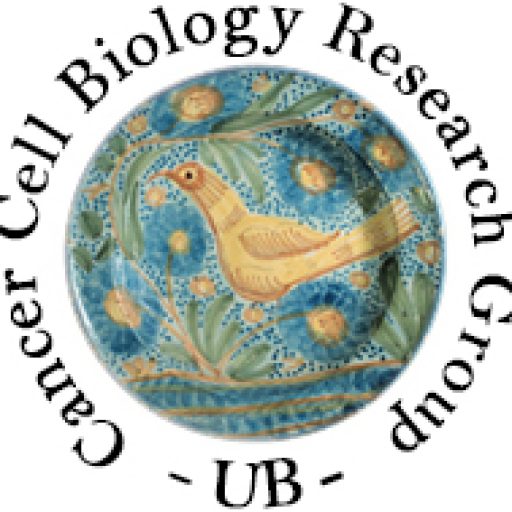
Vanessa Soto-Cerrato, Ph.D. Associate Professor
Biography
Vanessa Soto-Cerrato is Associate Professor at the University of Barcelona and Principal Investigator at the Cancer Cell Biology Research Group.
She obtained a Master Degree in Biomedical Sciences and a Ph.D. in Cellular Biology and Pathology, from the University of Barcelona, Spain. She has been working in several research fields, including Evolutionary Genetics (Biology School, University of Barcelona; 1998-2000), Molecular Genetics (Molecular Biology Institute, University of Copenhagen, Denmark; 2000-2001), Cancer Experimental Therapeutics (Medicine School, University of Barcelona; 2002-2007), and Drug Discovery Programs for Oncology, Neurology and Regenerative Medicine (Centre for Research and Pharmaceutical Development, Ferrer International Pharmaceuticals; 2008-2010). In 2010, she joined the Cancer Cell Biology Research Group (Medicine School, University of Barcelona) as a senior researcher, where she has been involved in the supervision and development of different projects focused on the modification of pH as a novel therapeutic approach. In particular, she has been working in the identification and preclinical development of novel anionophoric compounds for cancer treatment.
Research interests
Dr. Soto-Cerrato’s research is currently focused on the identification of potential therapeutic targets related to treatment resistance and their pharmacological inhibition for cancer treatment and tumor sensitization. In this regard, she is interested in the identification and preclinical development of novel specific inhibitors for targeted therapy, especially to inhibit anti-apoptotic proteins, as well as in the evaluation of novel combination therapies to overcome treatment resistance. She is also interested in the pharmacologically blocking of cellular processes that confer adaptive advantages to cancer cells, inducing treatment resistance, such as autophagy. Additionally, she is involved in the preclinical development of novel drug delivery systems for their use in cancer treatment.
ORCID ID: 0000-0001-5835-3595; Scopus ID: 9634118400
Selected Publications
- Multi-Smart and Scalable Bioligands-Free Nanomedical Platform for Intratumorally Targeted Tambjamine Delivery, a Difficult to Administrate Highly Cytotoxic Drug. Pérez-Hernández M, Cuscó C, Benítez-García C, Bonelli J, Nuevo-Fonoll M, Soriano A, Martínez-García D, Arias-Betancur A, García-Valverde M, Segura MF, Quesada R, Rocas J, Soto-Cerrato V, Pérez-Tomás R. Biomedicines, 2021.
- Click-tambjamines as efficient and tunable bioactive anion transporters. Carreira-Barral I, Mielczarek M, Alonso-Carrillo D, Capurro V, Soto-Cerrato V, Perez Tomas R, Caci E, Garcıa-Valverde M and Quesada R. ChemComm, 2020.
- Tumors defective in homologous recombination rely on oxidative metabolism: relevance to treatments with PARP inhibitors. Lahiguera Á, Hyroššová P, Figueras A, Garzón D, Moreno R, Soto-Cerrato V, McNeish I, Serra V, Lazaro C, Barretina P, Brunet J, Menéndez J, Matias-Guiu X, Vidal A, Villanueva A, Taylor-Harding B, Tanaka H, Orsulic S, Junza A, Yanes O, Muñoz-Pinedo C, Palomero L, Pujana MÀ, Perales JC, Viñals F. EMBO Molecular Medicine, 2020.
- Targeting autophagy for cancer treatment and tumor chemosensitization. Pérez-Hernández M, Arias A, Martínez-García D, Pérez-Tomás R, Quesada R, Soto-Cerrato V. Cancers, 2019.
- The natural-based antitumor compound T21 decreases survivin levels through potent STAT3 inhibition in lung cancer models. Martínez-García D, Pérez-Hernández M, Korrodi-Gregório L, Quesada R, Ramos R, Baixeras N, Pérez-Tomás R, Soto-Cerrato V. Biomolecules, 2019.
- Therapeutic strategies involving survivin inhibition in cancer. Martínez-García D, Manero-Rupérez N, Quesada R, Korrodi-Gregório L, Soto-Cerrato V. Med Res Rev 2018.
- Novel Indole-based Tambjamine-Analogues Induce Apoptotic Lung Cancer Cell Death through p38 Mitogen-Activated Protein Kinase Activation. Manuel-Manresa P, Korrodi-Gregório L, Hernando E, Villanueva A, Martínez-García D, Rodilla AM, Ramos R, Fardilha M, Moya J, Quesada R, Soto-Cerrato V, Pérez-Tomás R. Mol Cancer Ther 2017.
- Synthetic tambjamine analogues induce mitochondrial swelling and lysosomal dysfunction leading to autophagy blockade and cell death in lung cancer. Rodilla AM, Korrodi-Gregório L, Hernando E, Manuel-Manresa P, Quesada R, Pérez-Tomás R and Soto-Cerrato V. Biochemical Pharmacology 2017.
- Facilitated Anion Transport Induces Hyperpolarization of the Cell Membrane that Triggers Differentiation and Cell Death in Cancer Stem Cells. Soto-Cerrato, V.; Manuel-Manresa, P.; Hernando, E.; Calabuig-Fariñas, S.; Martínez-Romero, A.; Fernández-Dueñas, V.; Sahlholm, K.; Knöpfel, T.; García-Valverde, M.; Rodilla, AM.; Jantus-Lewintre, J.; Farràs, R.; Ciruela, F.; Pérez-Tomás R.; Quesada R. Journal of American Chemical Society 2015.
- CDK‐mediated activation of the SCFFBXO28 ubiquitin ligase promotes MYC‐driven transcription and tumourigenesis and predicts poor survival in breast cancer. Cepeda, D.; Ng, H.F.; Sharifi, H.R.; Mahmoudi, S.; Soto-Cerrato, V.; Fredlund, E.; Magnusson, K.; Nilsson, H.; Malyukova, A.; Rantala, J.; Klevebring, D.; Viñals, F.; Bhaskaran, N.; Zakaria, S.M.; Rahmanto, A.S.; Grotegut, S.; Nielsen, M.L.; Al-Khalili Szigyarto, C.; Sun, D.; Lerner, M.; Navani, S.; Widschwendter, M.; Uhlén, M.; Jirström, K.; Pontén, F.; Wohlschlegel, J.; Grandér, D.; Spruck, C.; Larsson, L.G.; Sangfelt, O. Embo Molecular Medicine 2013.
- Molecular interactions of prodiginines with the BH3 domain of anti-apoptotic Bcl-2 family members. Hosseini, A.; Espona-Fiedler, M.; Soto-Cerrato, V.; Quesada, R.; Pérez-Tomás, R.; Guallar, V. PloS One. 8 – 2, 2013.
- Identification of dual mTORC1 and mTORC2 inhibitors in melanoma cells: Prodigiosin vs. obatoclax. Espona-Fiedler, M.; Soto-Cerrato, V.; Hosseini, A.; Lizcano, J.M.; Guallar, V.; Quesada, R.; Gao, T.; Pérez-Tomás, R. Biochemical Pharmacology. 83 – 4, pp. 489 – 496. 2012. ISSN 0006-2952
- Prodigiosin induces the proapoptotic gene NAG-1 via glycogen synthase kinase-3beta activity in human breast cancer cells. Soto-Cerrato V; Viñals F; Lambert JR; Kelly JA; Pérez-Tomás R. Molecular Cancer Therapeutics. 6 – 1, pp. 362 – 369. 2007. ISSN 1535-7163



